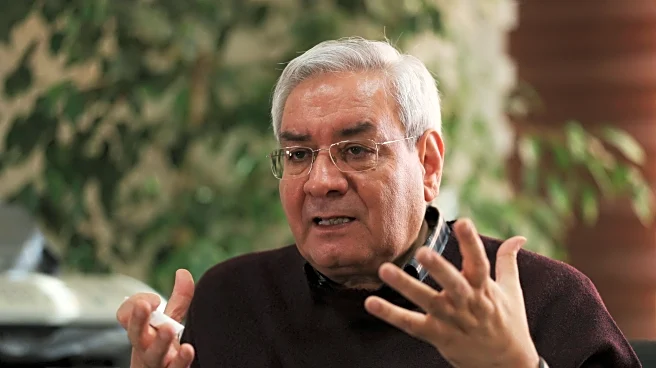What is the story about?
What's Happening?
The 2026 FIFA World Cup is set to be hosted by the United States, Canada, and Mexico, marking the first time the tournament will be held across three nations. Scheduled from June 11 to July 19, 2026, the event will feature 48 teams, an increase from the previous 32-team format. Matches will be played in 16 cities, with the United States hosting games in cities such as Atlanta, Boston, Dallas, and New York/New Jersey, among others. Canada will host matches in Toronto and Vancouver, while Mexico will stage games in Guadalajara, Monterrey, and Mexico City. The final will be held at MetLife Stadium in New Jersey. As of now, 19 countries have qualified, including debutants Cape Verde, Jordan, and Uzbekistan.
Why It's Important?
The expansion to 48 teams and the tri-nation hosting arrangement represent significant developments in the history of the FIFA World Cup. This format aims to increase global participation and viewership, potentially boosting tourism and economic activity in the host countries. The inclusion of new teams like Cape Verde, Jordan, and Uzbekistan highlights FIFA's efforts to diversify the competition and provide opportunities for nations that have not previously participated. The event is expected to have substantial economic impacts, particularly in the U.S., where the majority of matches, including the final, will be held.
What's Next?
The main draw for the tournament will take place on December 5 in Washington D.C., where the 48 teams will be divided into 12 groups. This will provide clarity on the matchups and the path teams will need to take to reach the final. As the tournament approaches, preparations in the host cities will intensify, including infrastructure upgrades and security arrangements. Stakeholders, including local governments and businesses, will likely ramp up efforts to capitalize on the influx of visitors and global attention.
Beyond the Headlines
The 2026 World Cup could set a precedent for future tournaments, encouraging more collaborative hosting arrangements and expanded team participation. This approach may influence FIFA's strategic planning and decision-making for subsequent World Cups, potentially leading to more inclusive and globally representative events. Additionally, the tournament's success could bolster the case for similar large-scale international events to be hosted in North America.















